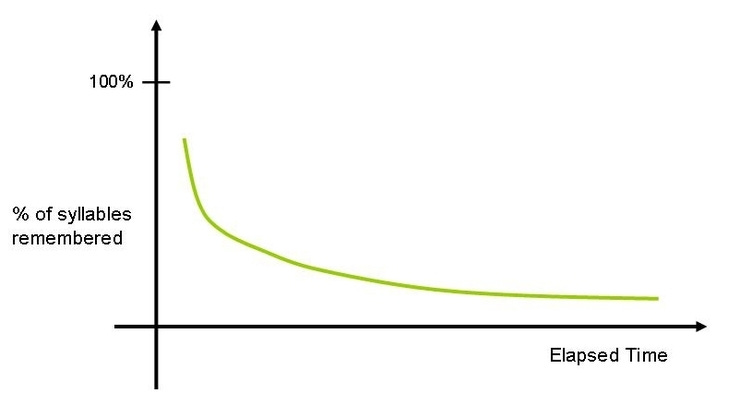Mental Models - The Ebbinghaus Curve 💡
Issue #40
What is the Ebbinghaus curve?
The Ebbinghaus curve is sometimes known as the forgetting curve.
It's a theory about how memory fades - how our retention of new information is lost over time if we don't put in effort to retain it.
Ebbinghaus ran some experiments on himself - he tried to memorize short nonsense words - and then tested his retention at later time intervals.
He remembered 100% immediately after learning, then he noticed he started forgetting really fast! In 20 minutes, 42% was gone. In 24 hours, 67%. In a month, 79% gone!
Here's a chart of the Ebbinghaus forgetting curve.
There's debate about the exact shape of the curve, and what factors affect it, but not a lot of debate that a forgetting curve exists.
Why is this interesting?
I probably don't have to convince you that the ability to retain new information is pretty important.
Ebbinghaus suggested that there are two main ways to increase retention.
Use spaced repetition. Revisit and reprocess the same information at spaced intervals. Exercise in repeatedly recalling something strengthens the memory. He came up with a formula about memory retention, and it suggests very specific intervals for reviewing the material: spend 10 minutes 24 hours later, then 5 minutes 7 days later, then 2-4 minutes 30 days later.
Use mnemonic devices. Identify systems such as a pattern of letters, ideas, or associations to assist in remembering. Wikipedia has a truly amazing collection of mnemonic examples.
I guess it's correct to say:
Use it or lose it...
Want to go deeper?
🔖 A more recent replication of the forgetting curve.
👍 Techniques such as spaced repetition and overlearning are relevant, I used Quizlet a while back, it's a great flashcard tool.
🤔 Ebbinghaus did also suggest that the speed of forgetting is affected by factors such as the material's meaningfulness or it's difficulty, as well as as other physiological factors such as stress and sleep. Sigh - yet another reason to try to decrease stress and get more sleep...
🔖 I liked this article that covers a bit more on the neuroscience of "learning, retention, and transfer".
🧠 Build your latticework! Revisit related mental models:
Got comments?
I'm particularly keen to hear your feedback on if the models are staying with you?
Have any of the mental models stuck with you more than others? Here's the list. Let me know!
📧 Reply to this email
🐦 Tweet @juliaclavien
Thanks for reading MM Weekly. If you enjoy this newsletter, you can support it by 👉 sharing it with a friend.



